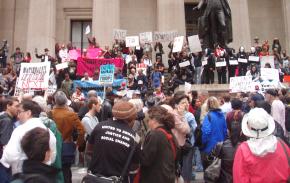Standing up against the bailout
By
QUICKLY ORGANIZED protests against the U.S. government's bailout for Wall Street at taxpayers' expense drew dozens and hundreds of people in cities around the country, with plans for more as Congress prepares to vote this week on the giveaway.
In New York City, angry shouts rang through the Wall Street financial district of Manhattan, with as many as 1,000 people participating during the day on September 25. The crowd marched through the streets several times, chanting "No more bail, send them to jail!"--and enthusiastic onlookers joined in, holding up posters declaring "Tax the rich" and "No bail-out!"
There were several demonstrations; one organized at noon by New York City Labor Council and another at 4 p.m. through an email call put out by independent journalist Arun Gupta.
The marches and rallies showed the bitter anger at Wall Street's theft of public money. Protesters traded insults back and forth with Wall Street executives, who at one point held up cash to their windows in a snub at the demonstration. But aside from this, the majority of the normally arrogant Wall Street suits kept their heads down in shame as they walked past demonstrators.

With the bailout estimated to cost $2,300 for every U.S. taxpayer--and probably much more--the protesters were speaking for millions in standing up against the plan, to judge from polls showing opposition to the giveaway to banks and Wall Street firms.
"This is welfare for giant investment banks, while the rest of us have to divvy up what's left," protester Darya Marchenkova said. "At the same time, people can't get into homeless shelters, can't afford health care and can barely survive. This is the ultimate betrayal and we're here to protest that."
Another protester, Barbara Hickernell, carried a sign that read, "Some people rob you with a six-gun; others with a fountain pen." Hickernell, who works in the financial district, said, "My retirement fund has been decimated by this, and now I have to work four more years just to get it back. My parents lived through the depression, and I wanted my kids to have a better life than I had, but I don't think that will happen."
The financial crisis has clearly exposed the priorities of the system. As Hickernell remarked, "The whole thing is 'Let me get all I can, and forget everyone else.' We need a society where everyone can profit and work together. We need to think of helping each other rather than greed."
In Washington, D.C., while congressional leaders were negotiating with the Bush administration, a few blocks away, homeless advocates and community activists were protesting the city's effort to shut down the Franklin School homeless shelter--an abject illustration of what kind of program will get the ax if the bailout goes though.
The demonstration was called to focus specifically on the shelter closure, which Mayor Adrian Fenty seems determined to push through just ahead of the winter season, so that the shelter property can be sold to a developer.
But the nearly 150-strong crowd of protesters was quick to make the connection between the city's plan to close the Franklin facility and the twisted priorities of a system that volunteers taxpayers' money to Wall Street millionaires. In fact, much of their fortunes came from pushing risky loans on thousands of people who now face homelessness.
There were protests in other cities as well. In Seattle, several dozen people gathered for protests, one at the Federal building and another at the headquarters of Washington Mutual, the savings and loan seized late last week by the government and sold off to JPMorgan Chase. In Burlington, Vt., around 40 people turned out for a demonstration.
According to Gupta, whose e-mail call brought out protesters on Wall Street, there were similar demonstrations in almost 200 cities and towns, from Greensboro, N.C., to Henderson, Nev.
"I'm an accountant, and even I oppose this," Akilah Stewart said in Seattle. "You can't say no to regulation, and then bail these banks out. If we're going to bail out anyone, it should be the victims of predatory lending.
"We did this same thing with deregulation in the 1920s, and we can see how that worked. After the Great Depression, we won social services, and now, they've cut those back. What kind of America are we going to have? One where you're on your own, or one with a social safety net?"


